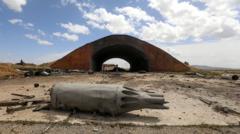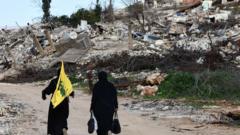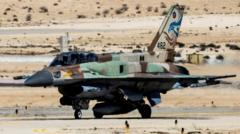The ongoing conflict in Syria is further complicated by Israel's air strikes on military bases, which not only target the Assad regime remnants but also send a pointed message to Turkey, intensifying their rivalry. With Turkey pursuing closer ties with Syria's new leadership, geopolitical implications grow as both nations navigate a fragile landscape.
Rising Tensions: Israel's Air Strikes on Syria Signal Challenges for Turkey

Rising Tensions: Israel's Air Strikes on Syria Signal Challenges for Turkey
Israel's recent bombardment of military targets in Syria escalates the regional standoff with Turkey, as both nations vie for influence over the war-torn country.
Air strikes conducted by Israel on military installations in Syria, including crucial airports, have sparked a reaction not just from the Syrian government but also from Turkey, which is actively trying to increase its influence in the region. On Wednesday night, strikes targeted places like the Hama military airport and the T4 base near Homs. Reports indicate that the Hama base was significantly damaged, leading to casualties among Syrian military personnel.
The Israeli bombardments seem to carry a dual message, with Israeli leaders accusing Turkey of undermining stability in Syria. Israel’s foreign minister has criticized Ankara for its role in the region, while the defense minister issued veiled threats to the Syrian interim president, Ahmed al-Sharaa, regarding the presence of “hostile forces.” This comes amidst Turkey's negotiations for a joint defense agreement with Sharaa's administration, which involves plans to station Turkish military assets in Syria.
While analysts note that the intensity of Israeli strikes, particularly on the Hama airport, indicates specific targets, they suggest that these actions reflect Israel's desire to avoid a broader confrontation with Turkey. Relations between these nations have soured, especially since the escalation of violence in Gaza. Ankara has subsequently placed restrictions on trade with Israel, accusing it of acts tantamount to genocide.
In response to Israel's air strikes, Turkey's foreign ministry condemned the actions as destabilizing, while asserting that the situation in Syria should primarily be determined by the Syrian people. Despite these provocations, Turkish officials have emphasized their commitment to avoiding military conflict with Israel.
Syria's new leadership, under Ahmed al-Sharaa, appears to be seeking peaceful coexistence, expressing willingness for diplomatic relations with Israel if circumstances permit. However, the Israeli response reflects persistent mistrust, particularly given Sharaa's historical ties to extremist groups.
With Israeli military operations increasingly targeting remnants of the Assad regime and its weaponry, the situation remains precarious. Civilians in Syria, who once hoped for a thaw in Israel relations following the fall of Assad, are now questioning Israel's stance as it continues to engage in military operations that impact the country broadly.
The background of internal strife in Syria complicates the political landscape. Although hopes were high that the end of Assad's rule would bring stability, violence among sectarian factions and remnants of former armed forces indicate a potential resurgence of conflict—making Syria susceptible to outside interference and complicating its efforts towards recovery. As the stakes grow higher, the fragile balance of power in Syria teeters on the brink of a new crisis, revealing the intricate dynamics involving Israel, Turkey, and Syria amid a tumultuous regional backdrop.



















